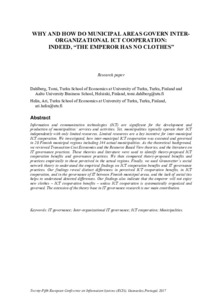Why and how do municipal areas govern interorganizational ICT : indeed, “The emperor has no clothes”
Tomi Dahlberg; Ari Helin
https://urn.fi/URN:NBN:fi-fe2021042718300
Tiivistelmä
Information and communication technologies (ICT) are significant for the development and production of municipalities’ services and activities. Yet, municipalities typically operate their ICT independently with only limited resources. Limited resources are a key incentive for inter-municipal ICT cooperation. We investigated, how inter-municipal ICT cooperation was executed and governed in 20 Finnish municipal regions including 144 actual municipalities. As the theoretical background, we reviewed Transaction Cost Economics and the Resource Based View theories, and the literature on IT governance practices. These theories and literature were used to identify theory-proposed ICT cooperation benefits and governance practices. We then compared theory-proposed benefits and practices empirically to those perceived in the actual regions. Finally, we used Granovetter’s social network theory to understand the empirical findings on ICT cooperation benefits and IT governance practices. Our findings reveal distinct differences in perceived ICT cooperation benefits, in ICT cooperation, and in the governance of IT between Finnish municipal areas, and the lack of social ties helps to understand detected differences. Our findings also indicate that the emperor will not enjoy new clothes – ICT cooperation benefits – unless ICT cooperation is systematically organized and governed. The extension of the theory base in IT governance research is our main contribution.
Kokoelmat
- Rinnakkaistallenteet [27094]
